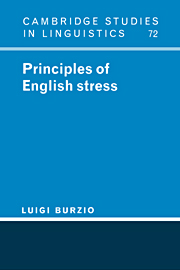Book contents
- Frontmatter
- Contents
- Preface
- 1 General introduction: overview and caveats
- PART I The stress of underived items
- PART II Stress and word-formation
- 6 Weak preservation
- 7 The range of stress-“placing” suffixes
- 8 Strong preservation
- 9 The range of neutral suffixes
- 10 Extensions and refinements
- References
- Subject index
- Index of names
- Index of languages
- Index of suffixes
6 - Weak preservation
Published online by Cambridge University Press: 20 August 2009
- Frontmatter
- Contents
- Preface
- 1 General introduction: overview and caveats
- PART I The stress of underived items
- PART II Stress and word-formation
- 6 Weak preservation
- 7 The range of stress-“placing” suffixes
- 8 Strong preservation
- 9 The range of neutral suffixes
- 10 Extensions and refinements
- References
- Subject index
- Index of names
- Index of languages
- Index of suffixes
Summary
Introduction
The view that even the “restressing” suffixes can preserve the metrical structure of the stem to some degree has been widely held in the past. That view is implicit in SPE's extensive use of the principle of the “cycle” (see for example SPE's [p. 43] derivation of theàtricálity), and it is reasserted quite explicitly by LP (pp. 300f.), who cite the many pairs like recíprocal/recìprocálity. Kiparsky (1979) also takes that view, claiming that not only stresses are preserved, as held by LP, but even the prominence relation between them (as represented by labeled trees). Kiparsky argues that, e.g. in tòtàlitárian, the first syllable is less prominent than the second, mirroring the pattern of tòtálity. In contrast to the latter views, however, HV (pp. 245f.), citing Kenyon and Knott (1944), claim that words like theàtricálity, postèriórity can in fact occur with secondary stress on either of the first two syllables, in their view a pattern common to underived items as well, hence exhibiting no particular preservation effect from theátrical, postérior, respectively. HV's theory reflects this general assessment of the facts in their “Stress Erasure” convention (HV, p. 83), which eliminates all earlier stresses at the beginning of each new cycle.
In this work we will make extensive use of the factual classifications given in Fudge (1984), which we find particularly thorough with respect to the above type of issue. The latter classifications indeed support the view of the majority of sources rather than that of HV.
- Type
- Chapter
- Information
- Principles of English Stress , pp. 169 - 198Publisher: Cambridge University PressPrint publication year: 1994



